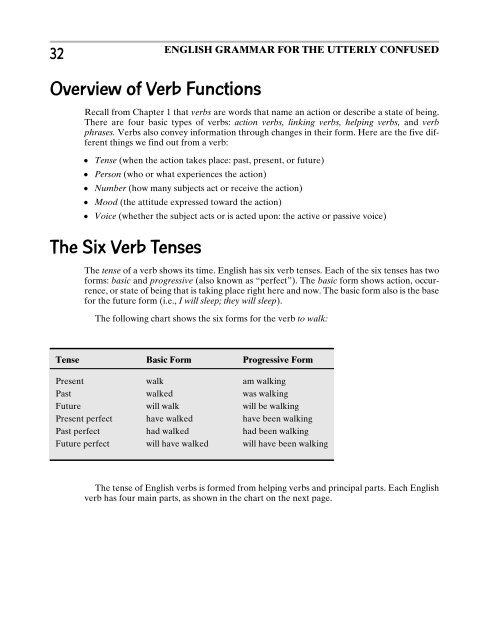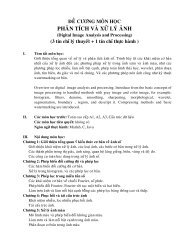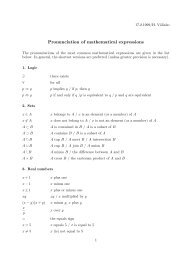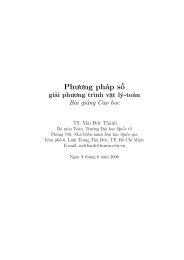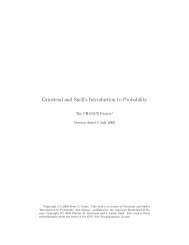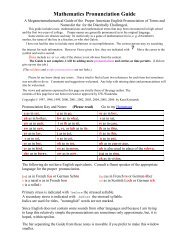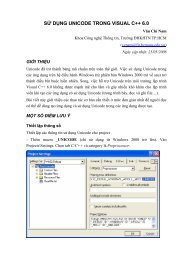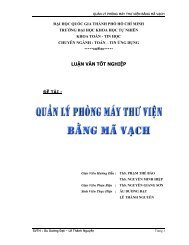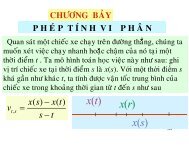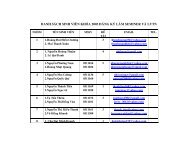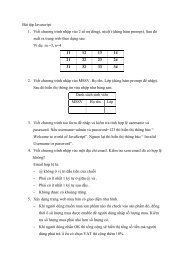- Page 2 and 3: Want to learn more?,We hope you enj
- Page 5 and 6: AcknowledgmentsIwould like to thank
- Page 7 and 8: xContentsUsing Who, Which, That 26I
- Page 9 and 10: xiiContentsCommas 150Dashes 153Elli
- Page 11 and 12: PrefaceIhave the world’s nicest s
- Page 13 and 14: PART 1Welcome toGrammarlandCopyrigh
- Page 15 and 16: 4ENGLISH GRAMMAR FOR THE UTTERLY CO
- Page 17 and 18: 6ENGLISH GRAMMAR FOR THE UTTERLY CO
- Page 19 and 20: 8ENGLISH GRAMMAR FOR THE UTTERLY CO
- Page 21 and 22: 10ENGLISH GRAMMAR FOR THE UTTERLY C
- Page 23 and 24: 12ENGLISH GRAMMAR FOR THE UTTERLY C
- Page 25 and 26: 14ENGLISH GRAMMAR FOR THE UTTERLY C
- Page 27 and 28: 16ENGLISH GRAMMAR FOR THE UTTERLY C
- Page 29 and 30: CHAPTER 2Using Pronouns CorrectlyDo
- Page 31 and 32: Using Pronouns Correctly21I like to
- Page 33 and 34: Using Pronouns Correctly23Answer: T
- Page 35 and 36: Using Pronouns Correctly251. A pron
- Page 37 and 38: Using Pronouns Correctly27Use that
- Page 39 and 40: Using Pronouns Correctly29(c) When
- Page 44 and 45: 34ENGLISH GRAMMAR FOR THE UTTERLY C
- Page 46 and 47: 36ENGLISH GRAMMAR FOR THE UTTERLY C
- Page 48 and 49: 38ENGLISH GRAMMAR FOR THE UTTERLY C
- Page 50 and 51: 40ENGLISH GRAMMAR FOR THE UTTERLY C
- Page 52 and 53: 42ENGLISH GRAMMAR FOR THE UTTERLY C
- Page 54 and 55: 44ENGLISH GRAMMAR FOR THE UTTERLY C
- Page 56 and 57: CHAPTER 4Using Adjectives andAdverb
- Page 58 and 59: Using Adjectives and Adverbs Correc
- Page 60 and 61: Using Adjectives and Adverbs Correc
- Page 62 and 63: Using Adjectives and Adverbs Correc
- Page 64 and 65: Using Adjectives and Adverbs Correc
- Page 66 and 67: Using Adjectives and Adverbs Correc
- Page 68 and 69: Using Adjectives and Adverbs Correc
- Page 70 and 71: CHAPTER 5Agreement: MatchingSentenc
- Page 72 and 73: Agreement: Matching Sentence Parts6
- Page 74 and 75: Agreement: Matching Sentence Parts6
- Page 76 and 77: Agreement: Matching Sentence Parts6
- Page 78 and 79: Agreement: Matching Sentence Parts6
- Page 80 and 81: Agreement: Matching Sentence Parts7
- Page 82 and 83: Agreement: Matching Sentence Parts7
- Page 84 and 85: Agreement: Matching Sentence Parts7
- Page 86 and 87: CHAPTER 6The 25 Most CommonUsage Pr
- Page 88 and 89: The 25 Most Common Usage Problems79
- Page 90 and 91: The 25 Most Common Usage Problems81
- Page 92 and 93:
The 25 Most Common Usage Problems83
- Page 94 and 95:
The 25 Most Common Usage Problems85
- Page 96 and 97:
The 25 Most Common Usage Problems87
- Page 98 and 99:
The 25 Most Common Usage Problems89
- Page 100 and 101:
The 25 Most Common Usage Problems91
- Page 102 and 103:
The 25 Most Common Usage Problems93
- Page 104 and 105:
The 25 Most Common Usage Problems95
- Page 106 and 107:
The 25 Most Common Usage Problems97
- Page 108 and 109:
PART 3SentenceSenseCopyright 2003 b
- Page 110 and 111:
102ENGLISH GRAMMAR FOR THE UTTERLY
- Page 112 and 113:
104ENGLISH GRAMMAR FOR THE UTTERLY
- Page 114 and 115:
106ENGLISH GRAMMAR FOR THE UTTERLY
- Page 116 and 117:
108ENGLISH GRAMMAR FOR THE UTTERLY
- Page 118 and 119:
110ENGLISH GRAMMAR FOR THE UTTERLY
- Page 120 and 121:
112ENGLISH GRAMMAR FOR THE UTTERLY
- Page 122 and 123:
CHAPTER 8Writing Correct andComplet
- Page 124 and 125:
Writing Correct and Complete Senten
- Page 126 and 127:
Writing Correct and Complete Senten
- Page 128 and 129:
Writing Correct and Complete Senten
- Page 130 and 131:
Writing Correct and Complete Senten
- Page 132 and 133:
Writing Correct and Complete Senten
- Page 134 and 135:
Writing Correct and Complete Senten
- Page 136 and 137:
Writing Correct and Complete Senten
- Page 138 and 139:
CHAPTER 9Sentence Coordination andS
- Page 140 and 141:
Sentence Coordination and Subordina
- Page 142 and 143:
Sentence Coordination and Subordina
- Page 144 and 145:
Sentence Coordination and Subordina
- Page 146 and 147:
Sentence Coordination and Subordina
- Page 148 and 149:
Sentence Coordination and Subordina
- Page 150 and 151:
Sentence Coordination and Subordina
- Page 152 and 153:
CHAPTER 10PunctuationDoI Needto Rea
- Page 154 and 155:
Punctuation1492. Use an apostrophe
- Page 156 and 157:
Punctuation151Here’s the overall
- Page 158 and 159:
Punctuation153Confusing: Luisa dres
- Page 160 and 161:
Punctuation155Periods1. Use a perio
- Page 162 and 163:
Punctuation157It’s a Wrap✔ Punc
- Page 164 and 165:
Punctuation1593. Why is there a com
- Page 166 and 167:
Punctuation161Completion Questions1
- Page 168 and 169:
164ENGLISH GRAMMAR FOR THE UTTERLY
- Page 170 and 171:
166ENGLISH GRAMMAR FOR THE UTTERLY
- Page 172 and 173:
168ENGLISH GRAMMAR FOR THE UTTERLY
- Page 174 and 175:
170ENGLISH GRAMMAR FOR THE UTTERLY
- Page 176 and 177:
172ENGLISH GRAMMAR FOR THE UTTERLY
- Page 178 and 179:
174ENGLISH GRAMMAR FOR THE UTTERLY
- Page 180 and 181:
176ENGLISH GRAMMAR FOR THE UTTERLY
- Page 182 and 183:
178ENGLISH GRAMMAR FOR THE UTTERLY
- Page 184 and 185:
PART 5Struttin’Your Stuffwith Sty
- Page 186 and 187:
184ENGLISH GRAMMAR FOR THE UTTERLY
- Page 188 and 189:
186ENGLISH GRAMMAR FOR THE UTTERLY
- Page 190 and 191:
188ENGLISH GRAMMAR FOR THE UTTERLY
- Page 192 and 193:
190ENGLISH GRAMMAR FOR THE UTTERLY
- Page 194 and 195:
192ENGLISH GRAMMAR FOR THE UTTERLY
- Page 196 and 197:
194ENGLISH GRAMMAR FOR THE UTTERLY
- Page 198 and 199:
CHAPTER 13Diction and ConcisenessDo
- Page 200 and 201:
Diction and Conciseness199Notice al
- Page 202 and 203:
Diction and Conciseness2012. Choose
- Page 204 and 205:
Diction and Conciseness203Redundant
- Page 206 and 207:
Diction and Conciseness205Wordy:Bet
- Page 208 and 209:
Diction and Conciseness2077. (Verna
- Page 210 and 211:
Diction and Conciseness209(c) Intel
- Page 212 and 213:
CHAPTER 14Words and Expressionsto A
- Page 214 and 215:
Words and Expressions to Avoid213Bi
- Page 216 and 217:
Words and Expressions to Avoid215Bu
- Page 218 and 219:
Words and Expressions to Avoid2173.
- Page 220 and 221:
Words and Expressions to Avoid2199.
- Page 222 and 223:
Words and Expressions to Avoid221(c
- Page 224 and 225:
Words and Expressions to Avoid223Co
- Page 226 and 227:
IndexCopyright 2003 by The McGraw-H
- Page 228 and 229:
228Indexalthough, as subordinating
- Page 230 and 231:
230IndexEditorial clarification, br
- Page 232 and 233:
232IndexNegative prefixes, 55neithe
- Page 234 and 235:
234IndexPronouns (Cont.):adjectives
- Page 236:
236IndexTitles of people (Cont.):no


